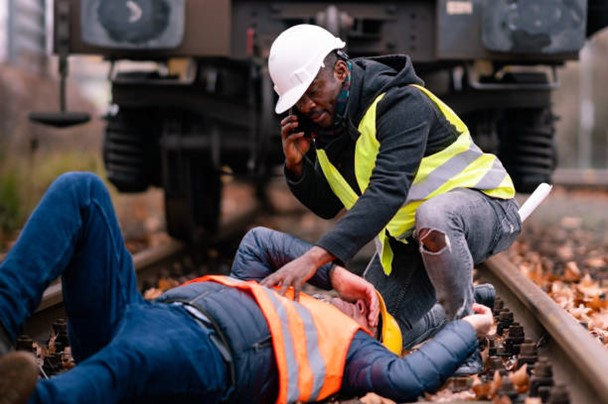
Working on the railroad remains one of the most dangerous jobs in America. Between moving equipment, heavy machinery, and exposure to hazardous materials, the risk of injury is substantial. When accidents occur, the consequences can be devastating—physically, emotionally, and financially.
Fortunately, railroad workers have unique legal protections that differ from traditional workers’ compensation laws. If you’ve been injured on the job, it’s critical to understand your rights under the Federal Employers Liability Act (FELA) and how you can pursue the compensation you deserve.
What Is FELA?
The Federal Employers Liability Act (FELA) was enacted in 1908 to protect and compensate railroad workers injured on the job due to employer negligence. Unlike regular workers’ comp claims, FELA requires the injured worker to prove that the railroad company was at least partially at fault.
This allows for potentially greater financial recovery, including:
- Medical bills (past and future)
- Lost income and diminished earning capacity
- Pain and suffering
- Emotional distress
- Loss of enjoyment of life
Common Causes of Railroad Worker Injuries
Railroad companies are responsible for providing a reasonably safe workplace. When they fail to do so, serious injuries or fatalities can occur. Some common examples of negligence include:
- Inadequate training or supervision
- Unsafe tools or equipment
- Poorly maintained tracks or facilities
- Exposure to harmful chemicals
- Fatigue from excessive hours
These hazards often lead to back injuries, amputations, traumatic brain injuries, and in some tragic cases, death.
Proving Negligence in a FELA Claim
To succeed in a FELA case, injured workers must show that the railroad company—or a co-worker—acted negligently and that this negligence played a role in the accident. Unlike workers’ comp, fault must be established, but even partial fault can lead to compensation.
That’s why having an experienced attorney is essential. At Buckeye Law Group, we conduct thorough investigations, work with industry experts, and fight tirelessly to protect injured railroad workers and their families.
If you’re a railroad employee injured on the job, don’t wait—reach out to Buckeye Accident Attorneys today to discuss your legal options and take the first step toward recovery.
Suing for a Loved One’s Death After a Trucking Accident
Understanding Wrongful Death Claims Involving Commercial Trucks Losing a loved one in a trucking accident is one of the most devastating events a family can experience. Alongside overwhelming grief, families
Trucking Logs and Black Boxes: What Evidence Can Be Used?
Why Evidence Is Critical in Truck Accident Claims Truck accident cases are far more complex than standard car crashes, largely because of the amount of technical evidence involved. When a
Slip and Fall Accidents: When Property Owners Fail to Keep You Safe
Why Slip and Fall Accidents Are Serious Personal Injury Cases Slip and fall accidents are often dismissed as minor or unavoidable, but the reality is very different. These incidents can
Slips, Trips, and Falls in Stores and Businesses: Your Legal Rights
Why Retail Slip and Fall Accidents Happen Retail stores, restaurants, and commercial properties experience constant foot traffic. When businesses prioritize speed or profits over safety, dangerous conditions can quickly lead
Obstetrical Malpractice and the Risk to Mothers and Babies
Understanding the Hidden Dangers in Modern Maternal Care Why Obstetrical Errors Are Still Happening Today Most expecting parents trust their medical teams completely. They assume that prenatal appointments, labor monitoring,
Can You Sue for Injuries During Pregnancy or Labor?
What Expectant Mothers Should Know About Medical Negligence How Pregnancy and Labor Injuries Typically Occur Pregnancy and childbirth dramatically change a mother’s body, and complications can arise even in low-risk
When Numbness Turns Into a Lifetime Injury
Understanding Nerve Damage Caused by Medical Negligence How a Simple Procedure Can Lead to Permanent Damage A routine medical procedure should never leave a patient with debilitating complications. Unfortunately, many
Nerve Injury After Medical Procedures—What You Should Know
When Numbness Turns Into a Lifetime Injury Why Post-Procedure Nerve Damage Deserves Immediate Attention A nerve injury after a medical procedure is far more than an uncomfortable side effect—it can
Injured as a Passenger on a Motorcycle—What Are Your Rights?
Passengers Have Strong Legal Protections Under Ohio Law Many people believe motorcycle passengers have limited legal options after a crash—but that’s completely false. In Ohio, injured motorcycle passengers almost always
Understanding Liability in Multi-Vehicle Motorcycle Wrecks
Why Multi-Vehicle Motorcycle Crashes Are So Complex When a motorcycle is involved in a crash with multiple vehicles, determining who is responsible becomes significantly more complicated. Unlike two-car collisions—where fault
